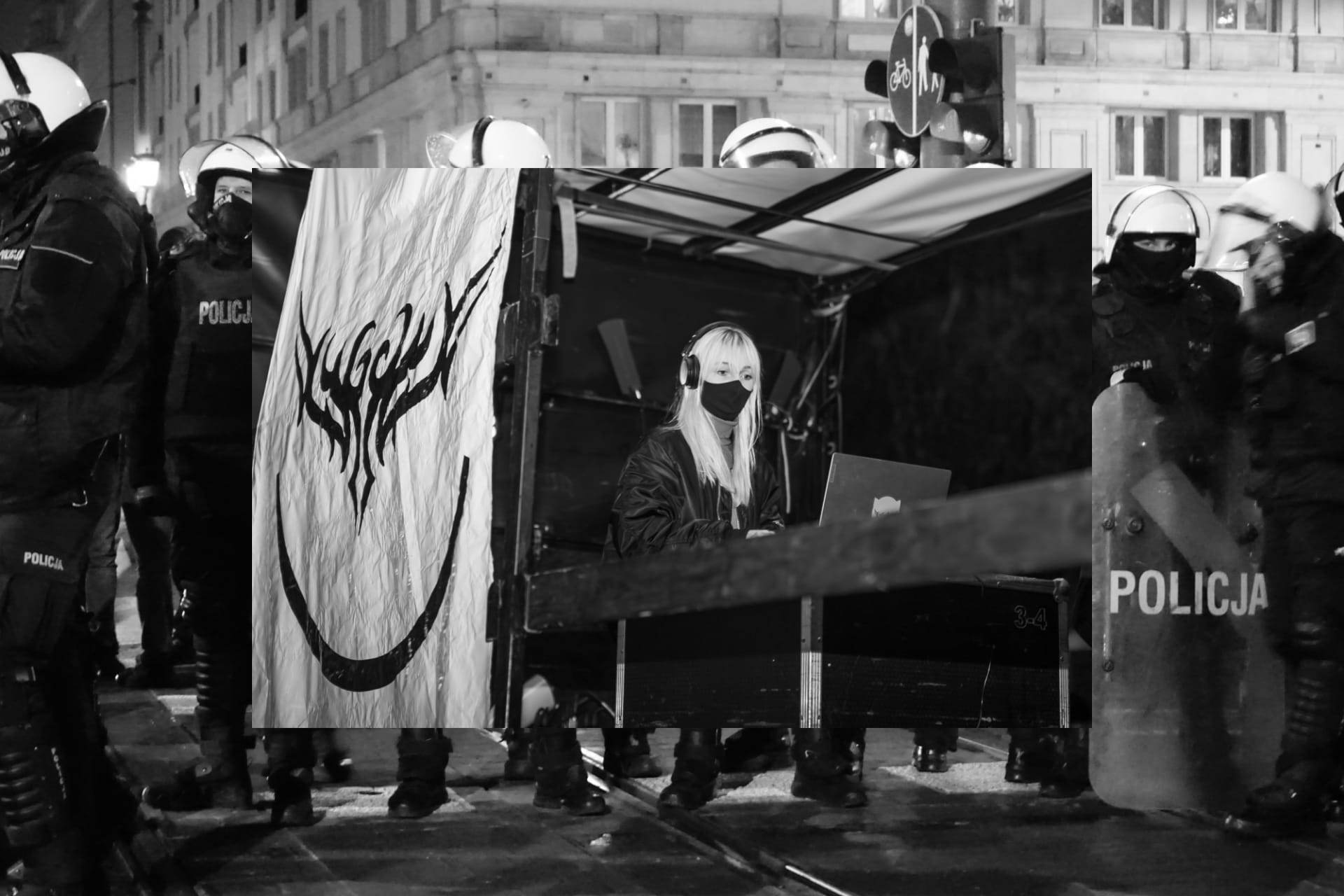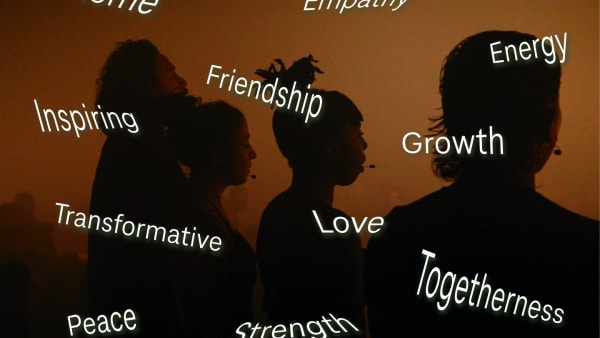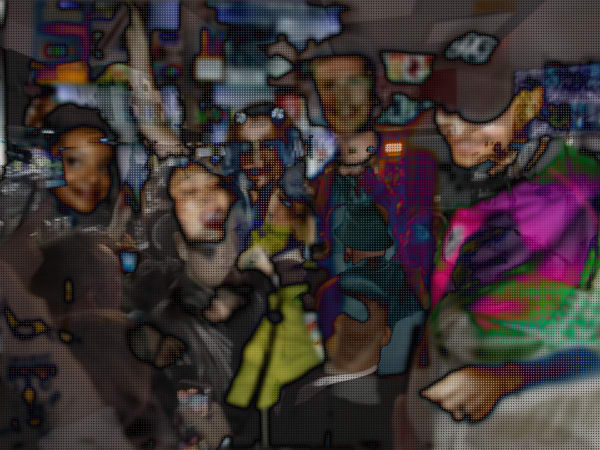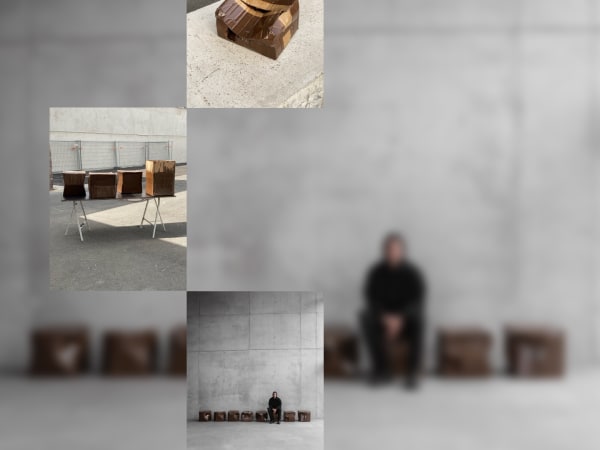

WIXAPOLONIA and Poland’s Hardcore Rave for Human Rights
After playing a 100,000-strong protest, members of the boundary-pushing hardcore collective discuss how electronic music enables activism in the Polish scene.
On the evening of October 28, Warsaw’s streets ignited under the incarnadine blaze of flares and the stammering pulse of 180 BPM hardcore. Six days earlier, Poland’s Constitutional Tribunal ruled that all abortions would be banned; the decision raised the heat on an already simmering social kettle, sparking a deluge of protests unprecedented in its scope since the country’s fight for independence in 1989. At the front lines, young people raved to the revolution’s soundtrack: aggressive neo-gabber, donk-core, and circus-like fanfare played over squelching bass lines at break-neck speed. The DJs—SPORTY SPICE, OCULTA, PUPPER DJ, and INNOMINEPATRIX, members of the all-femme crew WIXAPOLONIA—took turns mixing the tracks on top of a rolling platform flanked by more than 100,000 people. It was the biggest and most important DJ booking of their lives.
The remarkable draw to October’s protest, which was organized in part by the Polish women’s strike, Strajk Kobiet, was the result of years’ worth of mushrooming discontent. Small marches first dotted the country in 2016, when Law and Justice candidate Jarosław Kaczyński was elected to office (not coincidentally, the same year Strajk Kobiet opened its doors). Nationalism and gender-based discrimination has worsened in the election’s wake, reaching a critical turning point as reproductive rights have all but disappeared and the Polish republic has grown weary of the government’s conservative policies in general. Activists, musicians, performers, and club organizers who helped provide safe spaces for sexual minorities in the past have become critical in shaping the protests that have followed, creating a backbone around which members of the community can support each other, channel their feelings, and experiment with progressive ideas.
The current abortion debate stems from a coded discourse around trauma and Polish national identity with more than 30 years in the making. Abortion was legalized under the Nazi and Stalinist regimes in an attempt to curb population growth and stunt the country’s biological continuity. When Poland gained independence from the USSR in 1989, the Roman Catholic Church emerged as a powerful new unifying force, toppling communism’s aggressive secularism. Its leader, Pope John Paul II, presented himself as a defender of the Polish nation—a force capable of counteracting the genocides and political incursions that plagued the country for the majority of the 20th Century.
As the Church’s influence grew across Poland’s nascent institutions in the 1990s, criminalizing abortion became a priority in the political arena, too. The government concurrently re-traditionalized gender roles, restricted public debates on LGBTQ+ rights and civil partnership, and imposed an invisible but clear opposition between “true” Catholic Poles and non-Catholics associated with external occupying powers and the extermination of the Polish nation. The seesawing bans on abortion that followed can be read as a litmus test of the country’s transition away from communism, its introduction into the rule of law a shorthand for the hierarchy of other values coupled with Western liberal democracy.
Today, more than 90% of the Polish public identifies as Roman Catholic, which makes the fight for rights and representation among minorities feel even more urgent, if not Sisyphean. PUPPER DJ reflects that efforts to fight gender-based discrimination first coalesced in July 2019, when a gay pride parade in Białystok—located in Poland’s southeastern “bible belt”—was attacked by thousands of members of far-right groups. The debacle inspired tolerance marches across the country, including one in Warsaw, where a small parade this August resulted in the arrests of 48 people. “It was the breaking point for us,” she said. “It was so obvious that minorities were trying to fight for human rights that were repeatedly being violated, and I think the Polish scene realized that staying silent meant giving the green light for all this hate.” The abortion ban in October was the final straw.





Refracting protests through the prism of music and performance have helped instill the community with purpose and motivation amid this turmoil. Lucien Gasyński, a non-binary activist and a participant in the pivotal August demonstrations, said: “When music is going, we can be in the middle of a very bad situation, but we feel like we’re trying to make a revolution happen.” They added that electronic music, unlike horror-core or Polish freedom ballads, caters specifically to young people, and has played a significant role in bringing a new generation of protestors to the streets.
We are enemies of the religious boredom they want to serve us. This is hard music for hard times.
There’s a transgressive spirit embedded in the cartoonish aesthetics of hardcore electronica that lends it an obvious affiliation with Poland’s protest culture. Its excessiveness, and sometimes downright offensiveness, is an affront to right-wing politicians and religious fundamentalists. Even before the current spate of pro-choice demonstrations, the style was a way for young people to poke jabs at the singular cult of the Catholic Church while protecting themselves beneath the thick armor of irony. WIXAPOL—the original mixed-gender party from which the WIXAPOLONIA collective was formed—gave birth to the irreverent sub-genre “papacore” (translated in English as “popecore”), a bizarre brand of gabber that layers samples of Pope John Paul II’s sermons over brutally noisy beats. “Humor and jokes are a Polish specialty, especially in complicated moments of history,” WIXAPOL co-founder TORRENTZ.EU told me. “We are enemies of the religious boredom they want to serve us. This is hard music for hard times.”
Beyond the twisted satire, there’s a cohort of trained multidisciplinarians from across the electronic music scene who have been addressing politics through other forms of assistance and performance art. Club Service, a “secret group” of activists which include VJs, DJs, drag queens, and queer creators from Warsaw’s underground, provide legal advice, first aid, food giveaways, queer theater, and political lectures, among other forms of solidarity, for Poland’s burgeoning left wing. The group has formed loosely around a young woman named Mola, an organizer at Strajk Kobiet. Its first unofficial meeting was in 2017, when a collection of queer dancers and DJs gathered in front of the Georgian Embassy to rave in solidarity against the infamous drug raids on Bassiani. “For every demonstration we use their slogan, ‘We dance together, we fight together,’” Mola said. Many of the recent protests she’s helped stage have adopted this optimistic rave-as-rebellion template, bringing people to the streets to fight for political change one fist pump at a time.





These “techno blockades” can be effective in cultivating hope and disrupting a city’s physical infrastructure, but not all organizers are as confident in their ability to foment any real or lasting change. “It’s not like Bassiani,” Krakow-based activist Aśka Grochulska (AKA DJ virtual geisha) told me over Zoom. “They were fighting for one cause. They made a protest. They got it. But our problem is more complex. The system isn’t going to change just because of street protests.” Present-day Poland’s intractable relationship with Catholicism and conservative social mores has roots that extend below the level of the country’s judiciary body, and it won’t transform with the reversal of a single bill. And while the recent protests have helped raise awareness around Poland’s abiding civil rights issues, they’ve also faced more crackdowns from the government—which recently began issuing tickets and detentions—and violent tactics from the cops.
On November 28, the 102nd anniversary of the day Polish women won the right to vote, large protests planned to cross the city center were immediately thwarted by law enforcement who split the gathering before it could mobilize. At the protest’s designated starting point near Plac Zbawiciela, rows of policemen in riot gear kettled peaceful protestors, creating pockets of concentrated chaos in the immense crowd. TORRENTZ.EU, who had been planning for another WIXAPOL platform to head the parade with hardcore music and DJs as it had one month before, texted from deep in the throng: “chaos. they didn’t let cars or platforms. fucking siege. feeling like sparta.” 26 minutes later: “blocked by police. like fucking war.” Attendees at the fringes scattered as police pursued them asking for IDs—some wiping tear gas from their eyes—while people closer to the center were hauled off to vans or trapped within police enclosures, separated from their friends.
“We were organized, but the police were more organized,” TORRENTZ.EU told me later. Other people recounted harrowing tales the next day; Mola was pursued over a fence and hit over the head with a telescopic baton; farmaison, a member of Club Service, was handcuffed, beaten, and detained. Most of the people active in the protests will face court hearings and criminal charges. The measures are extreme, and worse than anything they’ve faced in recent months. “[The police] are adopting a different approach now,” PUPPER DJ added. “It’s going to be impossible to organize anything because the police are super on top of preventing anything from happening.” It’s been overwhelming, to say the least. A few protestors described ongoing issues sleeping and concentrating on work, as well as a new-found need to shut off from frenzied electronic music completely.
Rave culture has always been a way to rebel. And rave will connect us.
Recent setbacks have cast a pall over parties that were once just about having fun, and it’s hard for some not to feel discouraged. Multiple people told me that this is the most polarized Polish society has ever been, and that they fear its complete secession from the EU. During a visit to the Strajk Kobiet offices on Sunday, the morning after the foiled parade, organizers repeated how exhausted they were in a looping refrain. “We are extremely tired. Extremely tired,” one of the strike’s primary leaders, Karolina Micula, said. “It’s very motivating, but we are also pretty tired. For the first weeks, we’ve been working 15 hours per day, seven days per week.”
Still, Micula and her colleagues at Strajk Kobiet aren’t giving up; they have plenty of ideas about how to continue putting pressure on the government, even with the new obstacles in place. In addition to orchestrating flash dances, car strikes, and intervention art, they’re conducting research on real solutions that can be implemented at the judicial level.
There’s an abundance of thought being put into creating workarounds in the club scene, too. In Krakow, DJ virtual geisha coordinated a “live stream strike” that brought 60 women together in a 13-hour-long broadcast of political writings, DJ sets, readings, and theatrical performances. In Warsaw, Avtomat, an Oramics affiliate and a queer advocate who was also detained in the protests this past August, helped put on a performance in the windows of an apartment building, where he and a handful of friends played music, rapped, and read pieces by Audre Lorde for an audience gathered on the street below. In Berlin, there have been a series of marches in Kreuzberg, too, where Polish musicians and activists, like MELANIA . and the collective Dziewuchy, have DJed for upwards of 600 ravers ready to march. These events, MELANIA . said, are powerful because they’re fun.
Like hands reaching for each other in a room that’s suddenly gone dark, these small acts of solidarity and creative affinity are the forces bringing Poland’s movement for social justice together. “It’s not all black and sad,” one of the WIXAPOLONIA DJs told me. “Rave culture has always been a way to rebel. And rave will connect us.” At the protest in October, she played a song that she feels taps the moment’s zeitgeist: Paul Elstak’s gabber remix of Sham 69’s “If The Kids Are United.” It’s emerged again and again in circulating videos of the event, its chorus sped up over a storm of detonating 909 kicks:
“If the kids are united
Then we’ll never be divided
I don’t wanna be rejected
I don’t wanna be denied
And it’s not my misfortune
That I’ve opened up your eyes!”
Chloe Lula is a freelance journalist, DJ, and producer based in Berlin. You can follow her on Instagram, Facebook, and Twitter.
Photography by Karolina Pawłowska.
Published December 22, 2020. Words by Chloé Lula, photos by Chloé Lula & Karolina Pawłowska.












Follow Electronic Beats